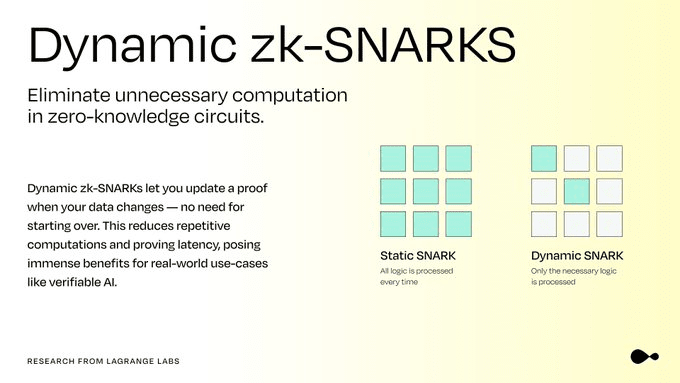With the rapid expansion of the blockchain ecosystem, data infrastructure and cross-chain services have become the core support for decentralized applications. Lagrange is committed to providing developers, enterprises, and communities with high-performance, multi-chain compatible, and reliable blockchain services. Whether it is DeFi, NFT, gaming, cross-chain asset management, or enterprise applications, Lagrange provides underlying data support, smart contract execution environments, and cross-chain strategy deployment capabilities. This article will deeply analyze Lagrange's value and potential from eight dimensions: project positioning, core technology, cross-chain capabilities, finance and application scenarios, developer ecosystem, privacy and security, community governance, and future strategy.
I. Project Positioning: Multi-Chain Data Infrastructure and Smart Protocol Platform
Lagrange's core goal is to become a high-performance, scalable, and reliable multi-chain data infrastructure and smart protocol platform:
Multi-chain Data Integration
Supports mainstream public chains such as BTC, ETH, BNB Chain, and Layer2 networks, achieving unified management and access of multi-chain data.
High-Performance Data Services
Provides low-latency, high-throughput data query and processing services through distributed storage, indexing optimization, and caching mechanisms.
Developer-Friendly Ecosystem
Open API, SDK, and GraphQL interfaces enable developers to quickly integrate data and smart contract functionalities.
Enterprise-Level Solutions
Provides customized data analysis, asset management, and monitoring tools for exchanges, financial institutions, gaming companies, and enterprises.
II. Core Technology Architecture
Lagrange adopts a modular technology architecture, mainly consisting of:
Data Layer
Distributed storage, encrypted indexing, and data verification mechanisms ensure data integrity, availability, and security.
Protocol Layer
Smart contract execution and cross-chain data verification provide core support for DeFi, NFT, gaming, and enterprise applications.
Interface Layer
Provides APIs, SDKs, GraphQL, and real-time data streams, enabling developers to easily access on-chain and cross-chain data.
Cross-Chain Bridge and Asset Management Layer
Supports cross-chain asset migration, transaction data verification, and strategy deployment, achieving multi-chain interoperability.
III. Cross-Chain Capabilities
Cross-Chain Bridge Technology
Achieves free migration of assets between different public chains, ensuring transaction security, transparency, and low cost.
Unified Asset Management
Provides users with a unified view of multi-chain assets, allowing asset management without switching wallets or platforms.
Cross-Chain Strategy Deployment
Developers can deploy smart contracts and financial strategies on different chains to maximize returns and diversify risks.
High Scalability
Cross-chain architecture supports access to more public chains and Layer2 networks to meet ecosystem expansion needs.
IV. Finance and Application Scenarios
DeFi Data Analysis
Provides real-time market data, transaction analysis, liquidity monitoring, and asset pricing, supporting smart strategies and risk management.
NFT and Metaverse Asset Management
Efficient storage of NFT metadata and transaction records, ensuring asset traceability and security.
Cross-chain Financial Tools
Aggregate multi-chain data to provide developers with a unified asset view, optimizing strategy deployment and portfolio management.
Enterprise-Level Financial Analysis
Provides on-chain asset monitoring, transaction tracking, risk management, and compliance tools to support enterprise digital transformation.
V. Developer Ecosystem and Tools
API and SDK
Provides rich interfaces and development tools to help developers quickly integrate data services and smart contracts.
Documentation and Examples
Provides detailed tutorials and example codes to lower development thresholds and improve development efficiency.
Test Network and Simulation Environment
Provides a secure testing environment for developers to verify strategies and application logic.
Community Technical Support
Promote developer experience sharing and ecological cooperation through technical forums, AMAs, and community events.
VI. Privacy and Security
Encrypted Storage and Transmission
Data is stored and transmitted with full encryption to ensure the security of user and enterprise data.
Distributed Verification
Multi-node joint verification of data to prevent tampering and single points of failure.
Smart Contract Security Audit
Multi-layer security audit mechanisms ensure reliable execution of smart contracts.
Privacy Protection Strategy
User sensitive information is protected both on-chain and off-chain, meeting decentralized privacy and compliance requirements.
VII. Community Governance and Ecological Development
Decentralized Governance
Through DAO proposals and voting mechanisms, the community participates in platform upgrades and strategy adjustments.
Incentive Mechanism
Node contributors, data providers, and community members can receive $LA rewards to form a positive ecological cycle.
Education and Promotion
Enhance community participation and technical levels through tutorials, AMAs, community events, and technical sharing.
Ecological Cooperation
Deep integration with wallets, exchanges, DeFi protocols, and infrastructure projects to build a complete ecological network.
VIII. Future Strategy
Multi-Chain Expansion
Supports more public chains and Layer2 networks to achieve unified management of global assets and data.
Intelligent Data Analysis
Combines AI with on-chain big data to provide intelligent predictions, behavioral insights, and strategy optimization.
Enterprise-Level Custom Services
Provides enterprises with advanced data analysis, asset monitoring, and risk management tools to achieve B2B and B2C coordinated development.
Ecological Closed Loop Construction
Integrates infrastructure, developer tools, community governance, and cross-chain support to create a sustainable ecological closed loop.
🔚 Summary:
Lagrange has built an efficient, secure, and scalable blockchain ecosystem through high-performance data infrastructure, cross-chain capabilities, smart protocols, and decentralized governance. It not only provides reliable data support for developers and enterprises but also lays a solid foundation for DeFi, NFT, cross-chain finance, and metaverse applications, making it an important innovative force in the field of blockchain infrastructure.
@Lagrange Official #lagrange $LA





